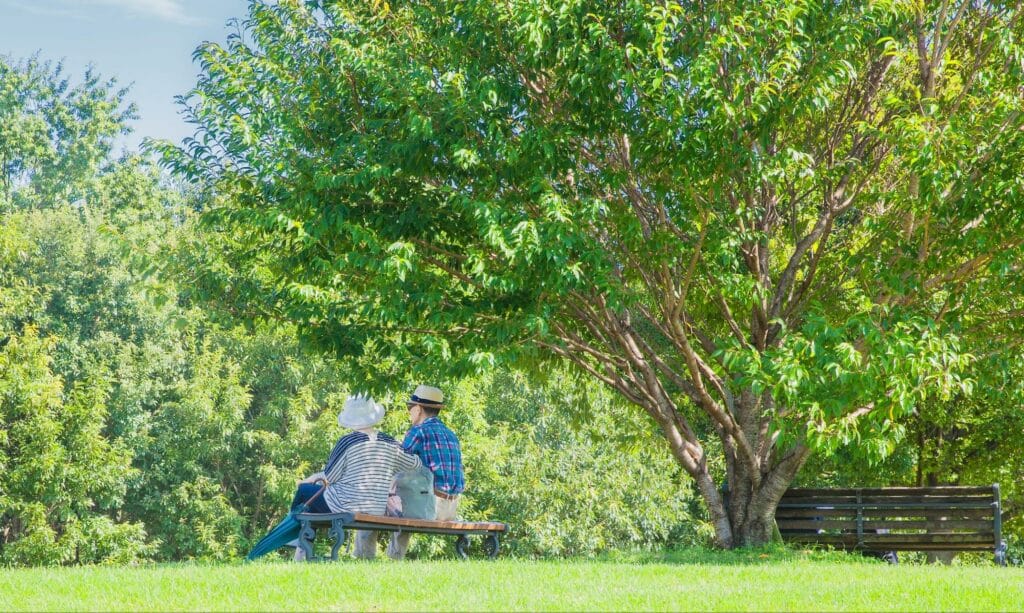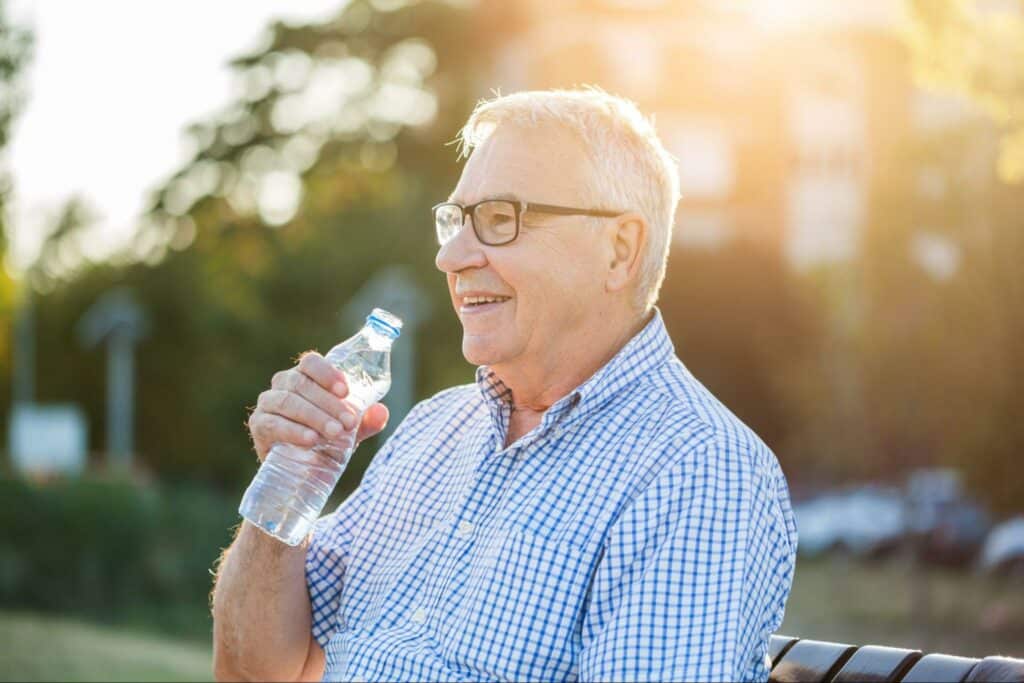Summer brings warmth, sunshine and opportunities for outdoor activities, but it also poses unique challenges for seniors. Older adults are more susceptible to heat-related illnesses and sunburns due to changes in their bodies’ ability to regulate temperature and increased sensitivity to sun exposure. It’s crucial for seniors and their caregivers to prioritize safety measures to ensure a healthy and enjoyable summer season. Keep reading as we explore summertime safety tips for seniors, while focusing on staying protected and comfortable in the sun.

Understanding Seniors’ Vulnerabilities
As we age, changes occur that make individuals more vulnerable to heat-related issues, such as:
- Decreased Sweat Gland Function: Aging reduces the body’s ability to sweat and cool down efficiently, increasing the risk of heat exhaustion and heatstroke.
- Chronic Health Conditions: Seniors often have pre-existing conditions such as heart disease, diabetes or respiratory disorders that can be exacerbated by extreme heat.
- Medications: Certain medications, including diuretics and drugs for high blood pressure, can affect hydration levels and increase sensitivity to sunlight.
- Skin Changes: Aging skin is more susceptible to sunburns and skin damage due to a decrease in melanin production and thinning of the skin layers.
Given these vulnerabilities, implementing preventive measures is essential to safeguard seniors’ health during the summer months.
Summertime Safety Tips for Seniors

1. Stay Hydrated:
- Encourage seniors to drink plenty of water throughout the day, even if they don’t feel thirsty. Dehydration can sneak up quickly, especially in hot weather.
- Limit caffeine and alcohol intake, as they can contribute to dehydration.
2. Dress Appropriately:
- Choose lightweight, loose-fitting clothing in light colors to reflect sunlight and keep the body cool.
- Wide-brimmed hats and sunglasses with UV protection help shield the eyes and face from direct sunlight.
3. Seek Shade and Limit Sun Exposure:
- Avoid going outside during peak sun hours (10 am to 4 pm) when UV rays are strongest.
- Use umbrellas, canopies or seek shade under trees or covered areas when outdoors for extended periods.
4. Apply Sunscreen Regularly:
- Use a broad-spectrum sunscreen with SPF 30 or higher on exposed skin, including face, neck, arms and legs.
- Reapply sunscreen every two hours–-or more frequently if swimming or sweating.
5. Plan Outdoor Activities Wisely:
- Schedule outdoor activities in the early morning or late afternoon when temperatures are cooler.
- Consider indoor alternatives or activities that involve minimal exertion during the hottest parts of the day.
6. Monitor Medications:
- Seniors taking medications should consult their healthcare provider about potential side effects related to sun exposure.
- Some medications can increase sensitivity to sunlight or affect hydration levels, requiring adjustments in dosage or timing.
7. Stay Cool Indoors:
- Ensure indoor spaces are well-ventilated and air-conditioned during heatwaves.
- Use fans or portable air conditioners to maintain a comfortable temperature, especially for seniors living alone.
8. Stay Informed about Heat Alerts:
- Monitor local weather forecasts and heat advisories to stay informed about extreme heat conditions in your area.
- Take precautions or reschedule outdoor activities during heat waves or high heat index days.
9. Stay Connected with Family and Friends:
- Seniors living alone should regularly check in with family members, neighbors or caregivers during hot weather to ensure their well-being.
- Establish a communication plan in case of emergencies or sudden health concerns.
10. Recognize Signs of Heat-Related Illness:
- Educate seniors and caregivers about the symptoms of heat exhaustion (e.g., heavy sweating, weakness, nausea) and heatstroke (e.g., high body temperature, confusion, loss of consciousness).
- Seek immediate medical attention if symptoms occur, as heatstroke can be life-threatening.
The Role of Caregivers and Community Support
Caregivers play a vital role in implementing summertime safety measures for seniors. They can assist in monitoring hydration, applying sunscreen, dressing appropriately and ensuring a comfortable indoor environment. Community support programs, senior centers and local organizations may also offer resources such as transportation to air-conditioned facilities or wellness checks during extreme heat events.
These practical tips not only protect seniors from sun-related health risks but also enhance their overall well-being and quality of life during the warmer months. Emphasizing prevention and proactive care ensures that seniors can continue to enjoy the outdoors while minimizing potential health hazards associated with summer weather.
Renaissance Village
At Renaissance Village, we encourage and support our residents in maintaining active and healthy lifestyles. Our luxury senior living accommodations are designed to promote well-being and independence, providing a vibrant community where you can thrive.
If you’re interested in learning more about our senior living communities, feel free to reach out or schedule a visit. Let’s embark on this journey together, embracing vitality and celebrating life at Renaissance Village.

